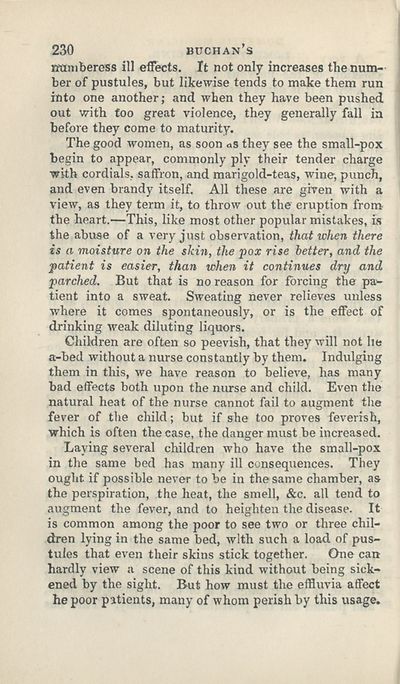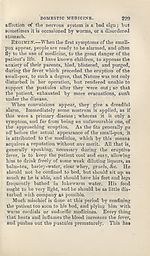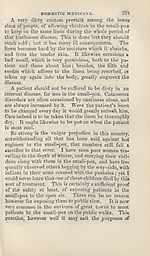Diseases > Domestic medicine
(264)
Download files
Complete book:
Individual page:
Thumbnail gallery: Grid view | List view

230 buchan’s
rmmbercss ill effects. It not only increases the num¬
ber of pustules, but likewise tends to make them run
into one another; and when they have been pushed
out with too great violence, they generally fall in
before they come to maturity.
The good women, as soon as they see the small-pox
begin to appear, commonly ply their tender charge
with cordials, saffron, and marigold-teas, wine, punch,
and even brandy itself. All these are given with a
view, as they term it, to throw out the eruption from
the heart.—This, like most other popular mistakes, is
the abuse of a very just observation, that when there
is a moisture on the skin, the pox rise better, and the
patient is easier, than when it continues dry and
parched. But that is no reason for forcing the pa¬
tient into a sweat. Sweating never relieves unless
where it comes spontaneously, or is the effect of
drinking weak diluting liquors.
Children are often so peevish, that they will not lie
a-bed without a nurse constantly by them. Indulging
them in this, we have reason to believe, has many
bad effects both upon the nurse and child. Even the
natural heat of the nurse cannot fail to augment the
fever of the child; but if she too proves feverish,
which is often the case, the danger must be increased.
Laying several children who have the small-pox
in the same bed has many ill consequences. They
ought if possible never to be in the same chamber, as
the perspiration, the heat, the smell, &c. all tend to
augment the fever, and to heighten the disease. It
is common among the poor to see two or three chil¬
dren lying in the same bed, with such a load of pus¬
tules that even their skins stick together. One can
hardly view a scene of this kind without being sick¬
ened by the sight. But how must the effluvia affect
he poor patients, many of whom perish by this usage.
rmmbercss ill effects. It not only increases the num¬
ber of pustules, but likewise tends to make them run
into one another; and when they have been pushed
out with too great violence, they generally fall in
before they come to maturity.
The good women, as soon as they see the small-pox
begin to appear, commonly ply their tender charge
with cordials, saffron, and marigold-teas, wine, punch,
and even brandy itself. All these are given with a
view, as they term it, to throw out the eruption from
the heart.—This, like most other popular mistakes, is
the abuse of a very just observation, that when there
is a moisture on the skin, the pox rise better, and the
patient is easier, than when it continues dry and
parched. But that is no reason for forcing the pa¬
tient into a sweat. Sweating never relieves unless
where it comes spontaneously, or is the effect of
drinking weak diluting liquors.
Children are often so peevish, that they will not lie
a-bed without a nurse constantly by them. Indulging
them in this, we have reason to believe, has many
bad effects both upon the nurse and child. Even the
natural heat of the nurse cannot fail to augment the
fever of the child; but if she too proves feverish,
which is often the case, the danger must be increased.
Laying several children who have the small-pox
in the same bed has many ill consequences. They
ought if possible never to be in the same chamber, as
the perspiration, the heat, the smell, &c. all tend to
augment the fever, and to heighten the disease. It
is common among the poor to see two or three chil¬
dren lying in the same bed, with such a load of pus¬
tules that even their skins stick together. One can
hardly view a scene of this kind without being sick¬
ened by the sight. But how must the effluvia affect
he poor patients, many of whom perish by this usage.
Set display mode to:
![]() Universal Viewer |
Universal Viewer | ![]() Mirador |
Large image | Transcription
Mirador |
Large image | Transcription
| Antiquarian books of Scotland > Diseases > Domestic medicine > (264) |
|---|
| Permanent URL | https://digital.nls.uk/119891310 |
|---|
| Description | Thousands of printed books from the Antiquarian Books of Scotland collection which dates from 1641 to the 1980s. The collection consists of 14,800 books which were published in Scotland or have a Scottish connection, e.g. through the author, printer or owner. Subjects covered include sport, education, diseases, adventure, occupations, Jacobites, politics and religion. Among the 29 languages represented are English, Gaelic, Italian, French, Russian and Swedish. |
|---|

